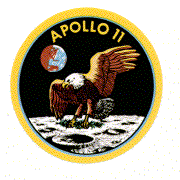Not heroes, my gluteus maximus

Michael Collins, the Command Module pilot on the Apollo 11 mission (the guy who stayed in Columbia and orbited the moon while Armstrong and Aldrin cavorted around on the surface) says that the Apollo astronauts worked hard, but weren't heroes.
Horse hockey, as M*A*S*H's Col. Potter would say.
Anybody who sits on top of a rocket the size of a skyscraper and lets people shoot him to the moon for the sake of scientific advancement and national prestige is a hero in my book. As Chuck Yeager says in the movie version of The Right Stuff, "It takes a special kind of man to volunteer for a suicide mission on national TV." And "suicide mission" was no exaggeration, given the things which not only could have gone wrong, but did.
The computer Neil Armstrong used to land the LM was far less powerful than the one you're sitting at right now. A blunder in the pre-launch preparation of the computer undercut its performance still further; Armstrong had to land the LM "by the seat of his pants," with a near-fatal result. Calling the Apollo moonshots "suicide missions" was a great deal closer to the mark than most people realize.
Anyone who has ever heard a recording of Armstrong's voice as he and Aldrin landed on the moon will recall the "1201" and "1202" alarms which repeatedly occurred as the LM descended toward the surface. Few realize that those codes were a message from the computer that it was rebooting. By rights, the landing should have been aborted. Armstrong and Aldrin overshot the planned landing zone, and came within seconds of not having enough fuel left in the LM to return them to lunar orbit, Collins, and Columbia for the trip home. But knowing the risk, Armstrong chose to attempt a manual landing anyway.
For all of Michael Collins' humility, after the near-disaster of Apollo 13 nobody on this planet could seriously doubt the heroism of the men who went to the moon forty years ago. And even today, it's impossible not to get a queasy feeling in the pit of one's stomach as one reads the following words, written by William Safire for President Nixon to deliver on national TV- a speech Nixon came within seconds of actually having to give:
Fate has ordained that the men who went to the moon to explore in peace will stay on the moon to rest in peace.
These brave men, Neil Armstrong and Edwin Aldrin, know that there is no hope for their recovery. But they also know that there is hope for mankind in their sacrifice.
These two men are laying down their lives in mankind's most noble goal: the search for truth and understanding.
They will be mourned by their families and friends; they will be mourned by their nation; they will be mourned by the people of the world; they will be mourned by a Mother Earth that dared send two of her sons into the unknown.
In their exploration, they stirred the people of the world to feel as one; in their sacrifice, they bind more tightly the brotherhood of man.
In ancient days, men looked at stars and saw their heroes in the constellations. In modern times, we do much the same, but our heroes are epic men of flesh and blood.
Others will follow, and surely find their way home. Man's search will not be denied. But these men were the first, and they will remain the foremost in our hearts.
For every human being who looks up at the moon in the nights to come will know that there is some corner of another world that is forever mankind.
Not heroes, my gluteus maximus.
HT: watergate.info


Comments